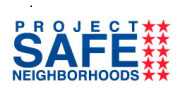
Project Safe Neighborhood logo
This funding is being used to hire new federal and state prosecutors, support investigators, provide training, distribute gun lock safety kits, deter juvenile gun crime, and develop and promote community outreach efforts as well as to support other gun and gang violence reduction strategies.
The Project Safe Neighborhoods initiative was launched in 2001 and built upon the foundations of previously existing gun crime reduction efforts such as the Clinton-era Strategic Approaches to Community Safety Initiative (SACSI), Richmond’s Project Exile, and the Boston Ceasefire program. By studying these and other efforts, the Department determined that successful gun crime reduction initiatives had three common elements: they were comprehensive, coordinated and community based. It is on these three fundamental principles that PSN is based. More specifically:
- Comprehensive — While enforcement is a necessary and important aspect of crime reduction programs, the most successful initiatives marry enforcement with prevention and deterrence efforts.
- Coordinated — Programs that ensure coordination between the enforcement, deterrence and prevention efforts are more likely to succeed than those that do not.
- Community-based — Gun crime is local, and the resources available to address it vary from district to district. Accordingly, any national gun crime reduction program must remain sufficiently flexible for jurisdictions to implement it in a way that both responds to the specific problem in that area, and accounts for the particular local capacities and resources that can be dedicated to it.
More information about Project Safe Neighborhoods can be found at the PSN website: www.psn.gov.


